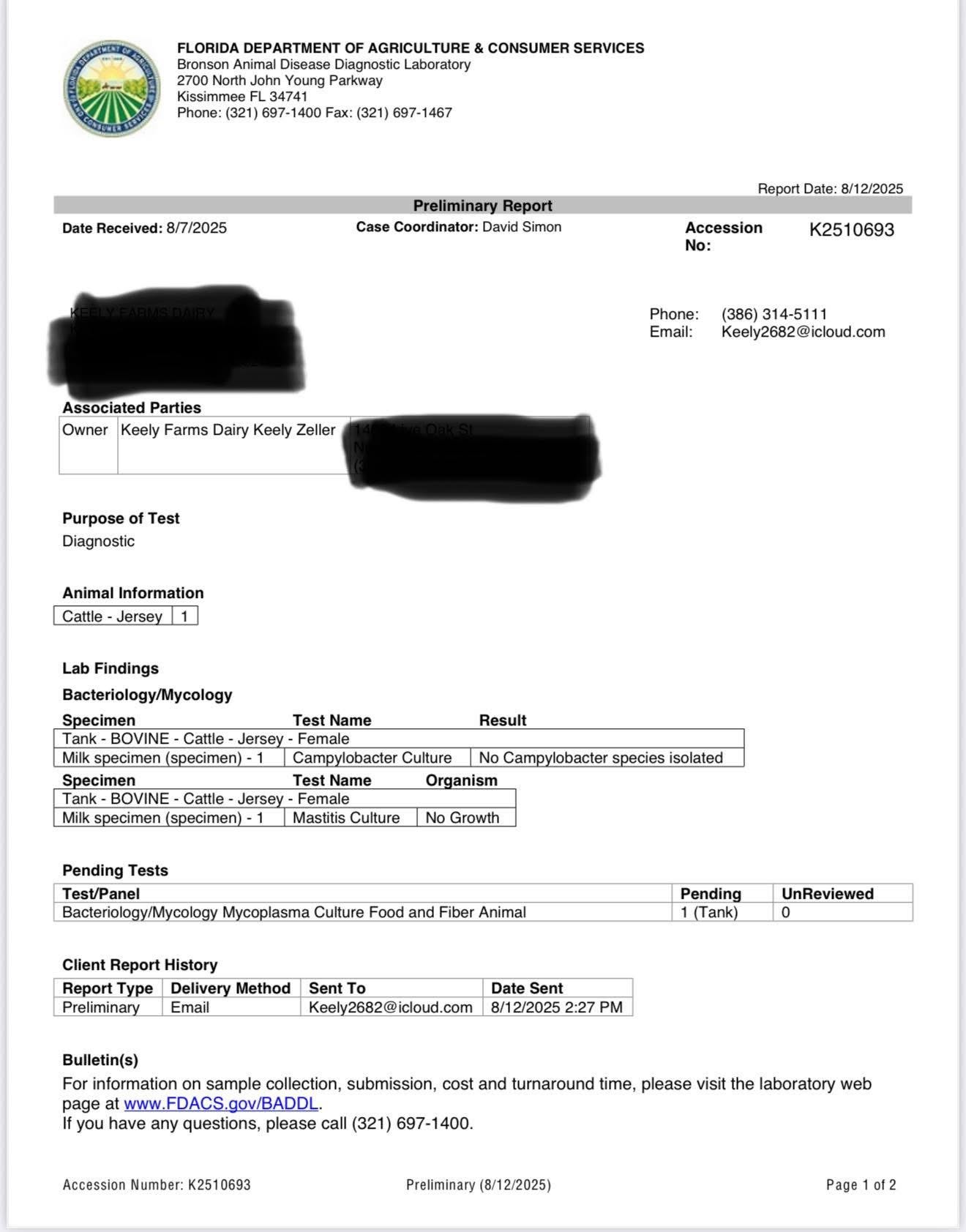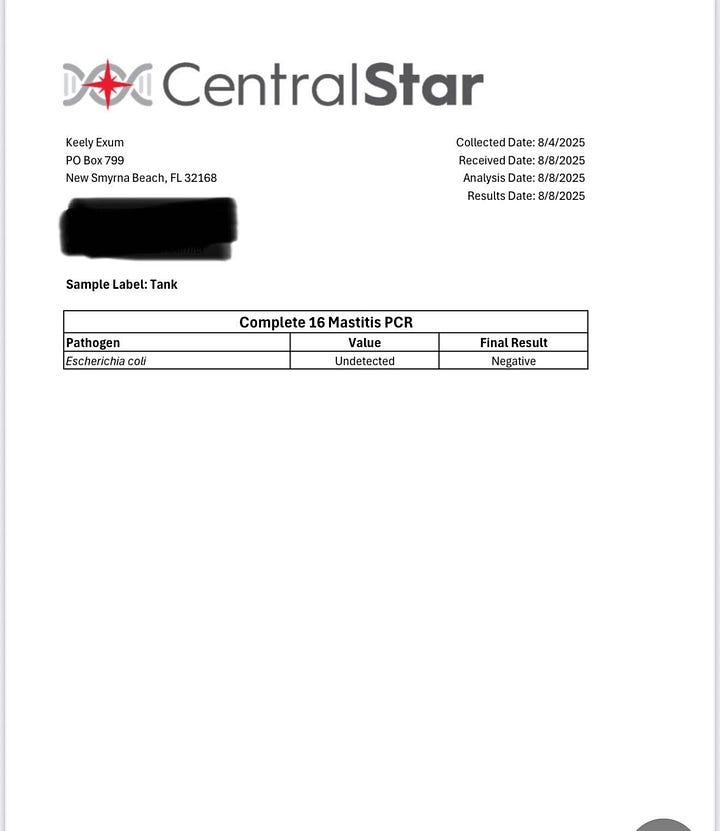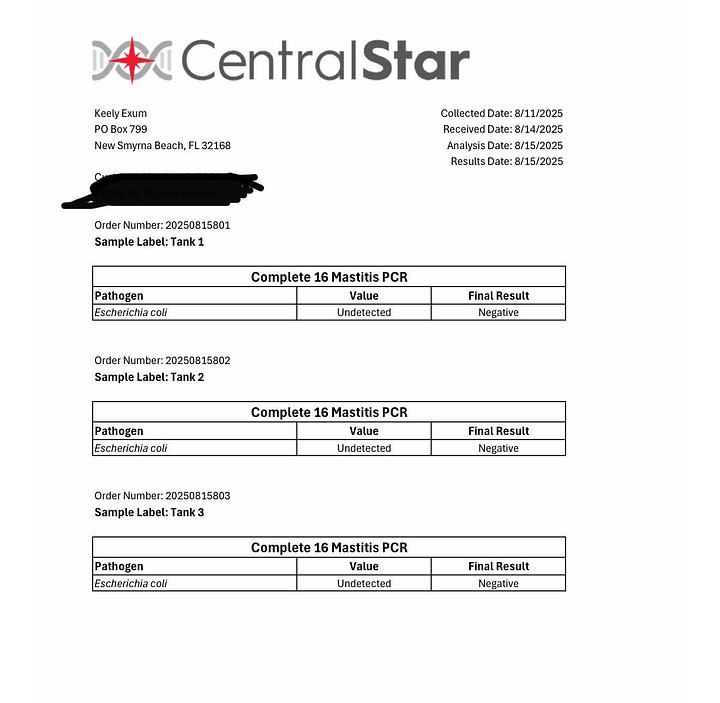Florida Raw Milk Lawsuit: Keely Farms Dairy Blamed for Outbreak, but Lab Tests Say Otherwise
A grieving mother, 21 illnesses, and a lost pregnancy. Florida officials blame raw milk — but third party testing show no contamination.
Rebels, raw milk is back in the headlines — and this time, the story is heartbreaking.
In June 2025, Rachel Maddox of New Smyrna Beach, Florida, bought raw milk labeled as “pet feed” from a local market. Within days, her toddler was violently ill with E. coli and Campylobacter. While caring for him, Maddox herself contracted a severe infection, went into septic shock, and tragically lost her 20-week unborn child.
By August, the Florida Department of Health (DOH) had tied 21 illnesses — including multiple children and several hospitalizations — to raw milk from Keely Farms Dairy. Maddox filed a lawsuit against both the dairy and the market, accusing them of negligence and product liability.
But here’s the twist: independent lab tests run by Keely Farms around the same time showed no contamination in their milk. Negative for E. coli. Negative for Campylobacter. Negative for mastitis bacteria.
So how can the DOH trace an outbreak to the farm while the farm’s own tests say the milk was clean? This contradiction is fueling one of the most heated battles in America’s ongoing raw milk debate — where food freedom, farm livelihoods, and public health collide.
The Maddox Family’s Ordeal
On June 8, Maddox’s two-year-old son drank raw milk she had purchased from a local organic market. Within hours, he developed violent diarrhea, vomiting, fever, and chills. He was hospitalized multiple times, with complications including intussusception (a dangerous intestinal condition) requiring surgery. Doctors treated him for possible hemolytic uremic syndrome (HUS), a kidney complication of E. coli.
While caring for her sick child, Maddox contracted Campylobacter — most likely through cleaning up his vomit and diarrhea, a known route of secondary infection. At 20 weeks pregnant, the illness drove her into septic shock. On June 18, doctors told her she was lucky to be alive. Her unborn baby did not survive.
“I became very ill — the sickest I’ve ever been in my life… I came really close to dying, and our unborn son did die,” Maddox told reporters when she filed suit on August 14.
The Health Department’s Findings
Florida DOH investigators traced the illnesses to raw milk purchased in northeast and central Florida. By early August, they had linked 21 confirmed cases since January 2025 to Keely Farms Dairy. Seven required hospitalization, and at least two developed severe complications like kidney failure.
On August 4, the DOH issued a public health advisory, warning Floridians about the dangers of consuming unpasteurized dairy. They noted “sanitation practices at this farm are of particular concern due to the number of cases”.
While the advisory initially stopped short of naming Keely Farms, reporters and follow-up releases identified the dairy as the outbreak source.
The Lawsuit: Product Liability Meets Food Freedom
Maddox’s lawsuit, filed in Seminole County, claims that Keely Farms and the market sold a defective and unreasonably dangerous product. It highlights how the milk jug was labeled “for animal consumption only” but that store staff reassured Maddox the label was “just a technical requirement.”
Her attorneys — Ron Simon & Associates, a national food safety firm, along with Newsome Law of Orlando — argue the farm violated Florida law, which bans raw milk sales for human consumption. They also contend that misleading labels and verbal assurances left families vulnerable.
Ron Simon, known for representing foodborne illness victims, stated:
“Raw milk producers know the extreme risk of bacterial infection and have a duty to follow strict sanitation and provide full warnings. Keely Farms Dairy met neither of these requirements, and this outbreak is the result.”
The lawsuit seeks compensatory damages for medical costs, pain and suffering, and the wrongful death of Maddox’s unborn child.
The Farm’s Defense: “We Tested Our Milk”
Keely Farms has pushed back. While declining detailed comment on pending litigation, the farm shared lab reports showing their milk tested negative for the pathogens identified in the outbreak.
Florida Department of Agriculture & Consumer Services (FDACS) Report (Aug 12, 2025)
Campylobacter Culture: No Campylobacter species isolated
Mastitis Culture: No growth
Pending Mycoplasma culture

CentralStar Lab Reports (Aug 8 & Aug 15, 2025)
PCR Pathogen Testing across multiple tanks:
Escherichia coli — Undetected / Negative
No major pathogens detected in three separate tank samples


Keely Farms argued they were “blindsided” by the DOH advisory and that their own data showed milk safety. They even posted some of these results to Facebook before later deleting them.
This evidence raises a key question: If the milk was clean when tested, how did 21 people still get sick?
Conflicting Science: Timing, Testing, and Trust
Public health experts counter that the absence of pathogens in later samples doesn’t clear the farm.
Here’s why:
Timing: The tests were conducted in August — after the illnesses had already occurred in June. A contaminated batch could have been consumed before testing.
Sampling variability: Not every jug or tank is tested. Contamination can occur sporadically.
Post-processing risk: Contamination may have entered during bottling, storage, or handling after the milk left the farm.
As one epidemiologist put it: “Twenty-one people don’t develop the same rare bacteria by coincidence. The epidemiological link is stronger than a negative lab result after the fact.”
Food freedom advocates see it differently: “If multiple labs tested tanks and found nothing, maybe the outbreak wasn’t caused by Keely’s milk — or maybe the state is scapegoating raw milk.”
This clash between epidemiological tracing and farm-reported testing is central to the case.
Florida’s Raw Milk Loophole
At the heart of the lawsuit is Florida’s “pet food” loophole:
Florida bans raw milk for human consumption.
Farms may sell raw milk if it’s labeled for animals only.
In practice, consumers knowingly purchase it for themselves.
Keely Farms’ own website warned buyers: “Since Federal law prohibits the sale of raw milk for human consumption, please DO NOT discuss such use with us.”
Critics argue this loophole creates a gray market where raw milk escapes proper regulation. Advocates argue it’s the only way for Floridians to access a traditional food their families want.
Public Reactions: Divided and Emotional
The case has generated national attention. CBS, AP, Fox, and NBC have all covered it.
Food safety experts: call raw milk “too risky,” especially for children and pregnant women. Dr. Catherine Adams Hutt warned: “This is not just a little stomach bug… This is very dangerous.”
Food freedom advocates: defend the right to choose raw milk and point to Keely’s negative lab results as evidence the state may be overstating the case.
Florida Surgeon General Joseph Ladapo: struck a libertarian tone on X, posting: “Floridians have the freedom to make informed health choices… Be aware of your source and know the risks.”
Florida Commissioner of Agriculture: urged residents to drink only pasteurized milk.
On social media, the Maddox family’s story has been both a rallying cry for stricter regulation and a cautionary tale of government overreach.
What’s at Stake for Farmers and Consumers
The outcome of Maddox v. Keely Farms could reshape Florida’s raw milk landscape:
If Maddox wins:Courts may decide “pet food” labeling doesn’t protect dairies from liability.
Florida lawmakers may be pressured to tighten or ban raw milk sales.
If Keely Farms wins: The loophole could remain intact. Advocates may push for regulated legalization (like in California) instead of shadow sales.
Either way, this case is likely to influence national raw milk policy debates.
Rebels’ Perspective: Food Freedom With Responsibility
Rebels, this is the tension we always confront: the desire for food freedom versus the duty to protect public health.
We believe:
Consumers should have the right to choose raw milk.
Farmers must maintain the strictest safety standards.
States should regulate transparently instead of forcing gray-market loopholes.
California and Pennsylvania prove it’s possible to legalize raw milk while requiring rigorous testing and inspections. Florida could follow that model instead of leaving farmers and families in limbo.
Conclusion: The Future of Raw Milk in Florida
The Maddox family’s tragedy is undeniable. A toddler hospitalized, a pregnancy lost — and a community shaken.
But the evidence isn’t simple. The DOH links the outbreak to Keely Farms. Independent lab tests say the milk was clean. The truth may lie somewhere in between: a contaminated batch long gone, or a regulatory system too murky to keep families safe.
What’s clear is this: Florida’s “pet food” loophole is unsustainable. Families deserve transparency, farmers deserve protection, and rebels deserve freedom with responsibility.
Until then, the Keely Farms lawsuit will stand as a defining battle in the raw milk wars.
Viva La Regenaissance!
Rebels, food freedom is under the microscope. Want more deep-dive investigations into farm policy, raw milk laws, and regenerative agriculture?

